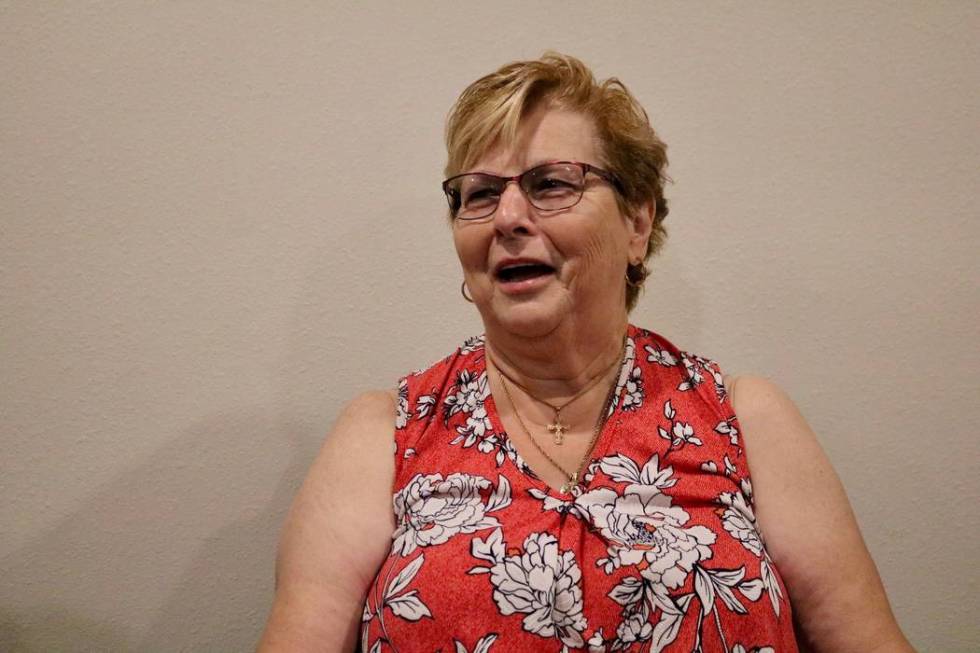Lucky unlucky Henderson woman beat pancreatic cancer’s odds

As doctors wheeled 75-year-old Mary Kay Duda into surgery for a pancreatic tumor, she turned to her daughter, Katie, and said, “See you on the flip side.”
Katie Duda, 36, rolled her eyes at the memory, humorous now that her mother is nearing two years cancer-free. At the time, though, the thought of losing her mother was unbearably real.
Mary Kay Duda says she’s one of the lucky unlucky ones. Unlucky in that the tumor growing inside her enveloped the head of her pancreas. Unlucky in that one Las Vegas surgeon declined to operate because the tumor was so large.
But the Henderson woman was lucky — “with the grace of God,” she adds — and came through the risky and complex 10-hour surgery known as a Whipple procedure that saved her life.
Pancreatic cancer has been in the news with word this past week that former Senate Majority Leader Harry Reid, 78, had undergone surgery to have a tumor removed from his pancreas. The family statement did not say that the tumor was cancerous, but experts say the fact that Reid’s doctors are following the surgery with chemotherapy almost certainly indicates that it was.
Major cause of cancer death
Pancreatic cancer is the fourth-leading cause of cancer death in the United States, according to the Centers for Disease Control and Prevention.
Even with successful surgery and chemotherapy, the average survival rate is between 26 and 30 months, said Dr. Charles St. Hill, Duda’s surgeon at University Medical Center and a surgical oncologist who teaches at UNLV’s School of Medicine.
“Last year, 43,000 people were diagnosed with pancreatic cancer in the United States,” St. Hill said. “And there were 53,000 people living with pancreatic cancer in that same year. Which means that every year, there’s only a few people who make it past a year.”
St. Hill said pancreatic cancer takes many forms and stressed that he can’t generalize about Sen. Reid’s case without knowing the particulars.
In Duda’s case, another lucky break helped her beat the odds. Her cancer presented itself differently than most — one day, while at church, she started to feel pain in her lower abdomen that reminded her of a baby’s kick.
Usually, a tumor would block the bile duct and cause jaundice in late stages, but not pain. But after visiting several doctors and urgent care clinics that misdiagnosed her case as diverticulitis, a CAT scan and endoscopy showed Duda was living with a massive lump on her pancreas. In other words, those kicks in the gut meant her cancer was diagnosed while it was still Stage 1.
Katie Duda took to the internet to research her mom’s options.
“I’m very persistent and kept searching and researching, and found out there was this procedure called the Whipple procedure,” she said.
Personal plea answered
She called St. Hill’s office, but he was out of town. After another local doctor declined to take her mom’s case, she called back.
More internet scouring turned up St. Hill’s personal email, so Katie Duda drafted a plea.
“I moved out here with the plan that I was burying my father, not my mother,” said Katie Duda, who lost her father last year to heart disease. “Taking no as an answer (from St. Hill) was not happening.”
He agreed to take the case.
Tumor aside, Duda was healthy, making her a good candidate for surgery, and the cancer hadn’t spread so far that it was inoperable.
But the Whipple procedure — or pancreaticoduodenectomy, in technical terms — wasn’t without risks. With a 5 percent chance of dying and 40 percent chance of complications, it’s one of the more dangerous cancer-related surgeries, St. Hill said.
That didn’t stop Duda. As doctors whisked her to the operating room, Duda said she never once thought she might not make it. She had a granddaughter’s first Holy Communion to attend.
“Now, I have long-term goals,” she said, including another granddaughter’s Holy Communion in four years.
Eventually, doctors tell Duda, the cancer will likely return. While treatments have improved in recent years, there still is no cure, St. Hill said.
“So 20 years ago, colon cancer was like this, where people didn’t live that long after you do surgery … but the chemotherapy over the years has gotten much better,” St. Hill said. “We still have a long way to go in terms of treatment” for pancreatic cancer.
That outlook doesn’t scare Duda, who’s deeply rooted in her Catholic faith. Every positive step in life’s journey comes, again, “with the grace of God,” she says.
“The reality is this should’ve killed me two years ago, and it didn’t,” she said. “I’ve been given the gift of life this far, and whatever else I get is going to be a gift.”
Contact Jessie Bekker at jbekker@reviewjournal.com or 702-380-4563. Follow @jessiebekks on Twitter.